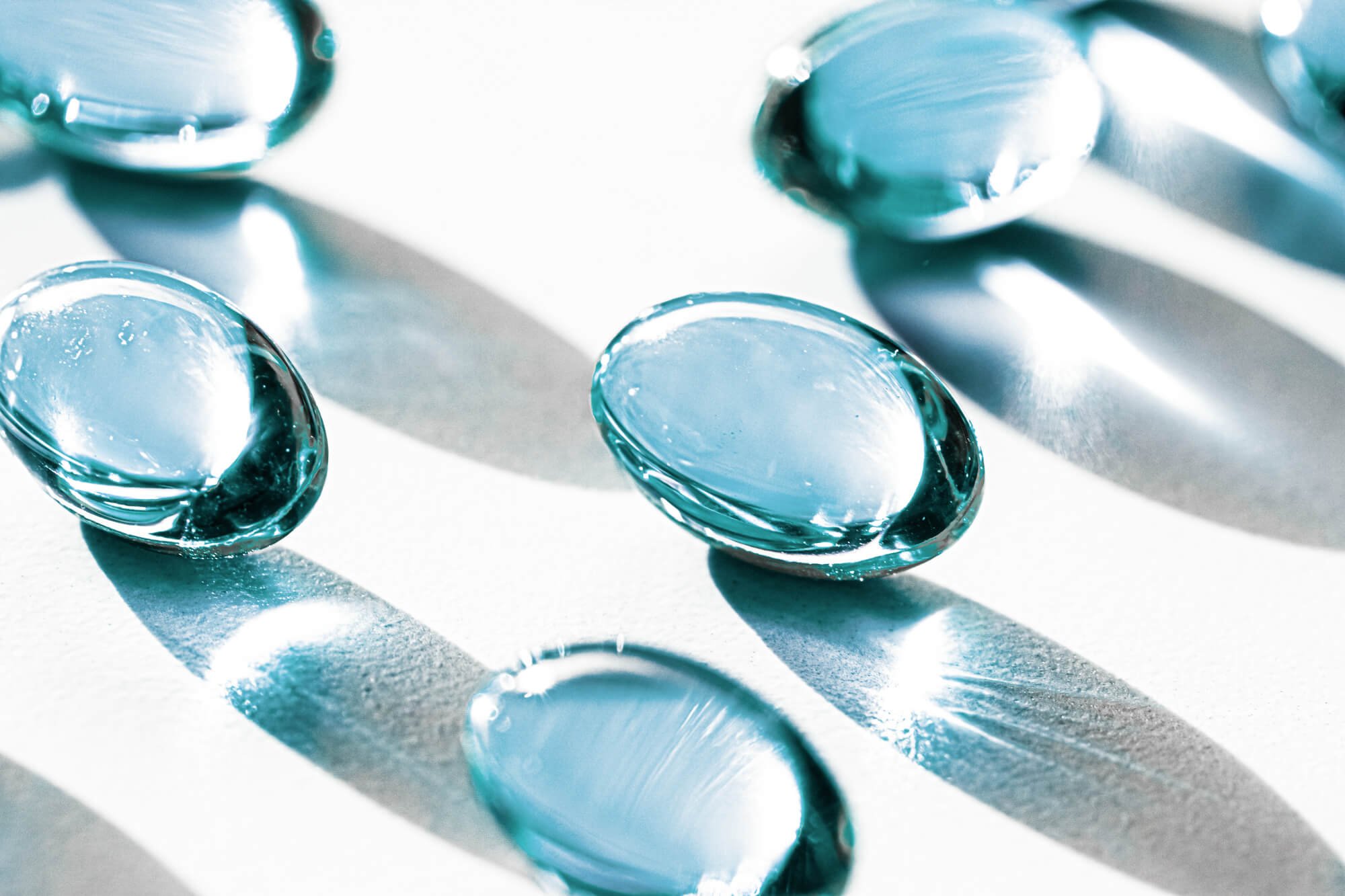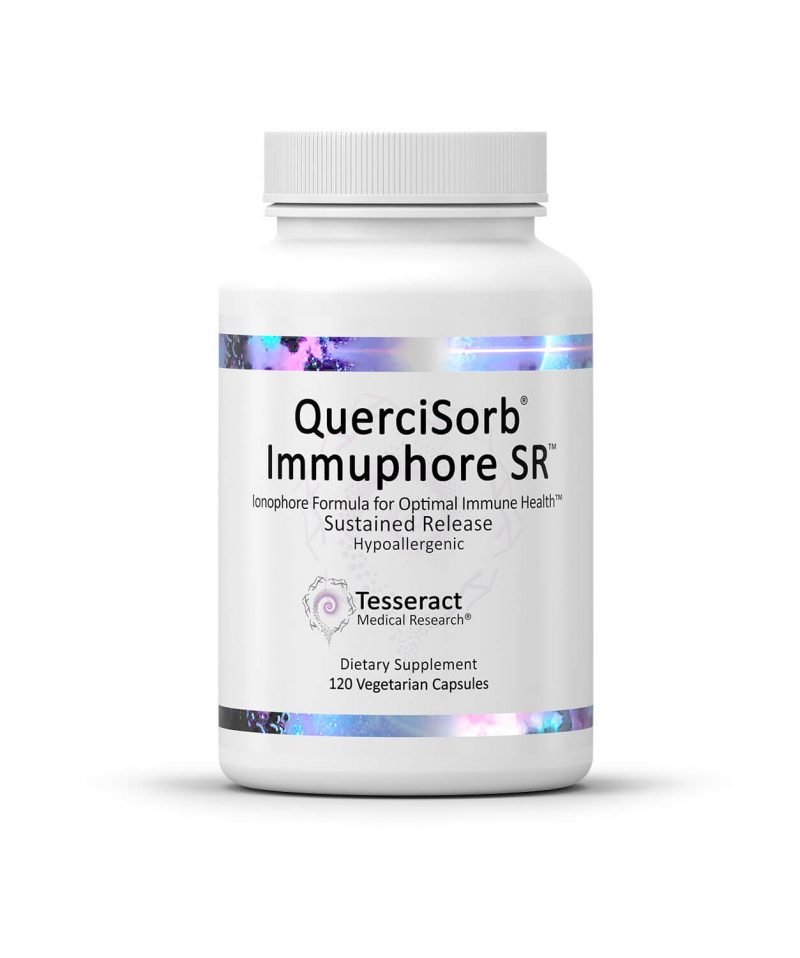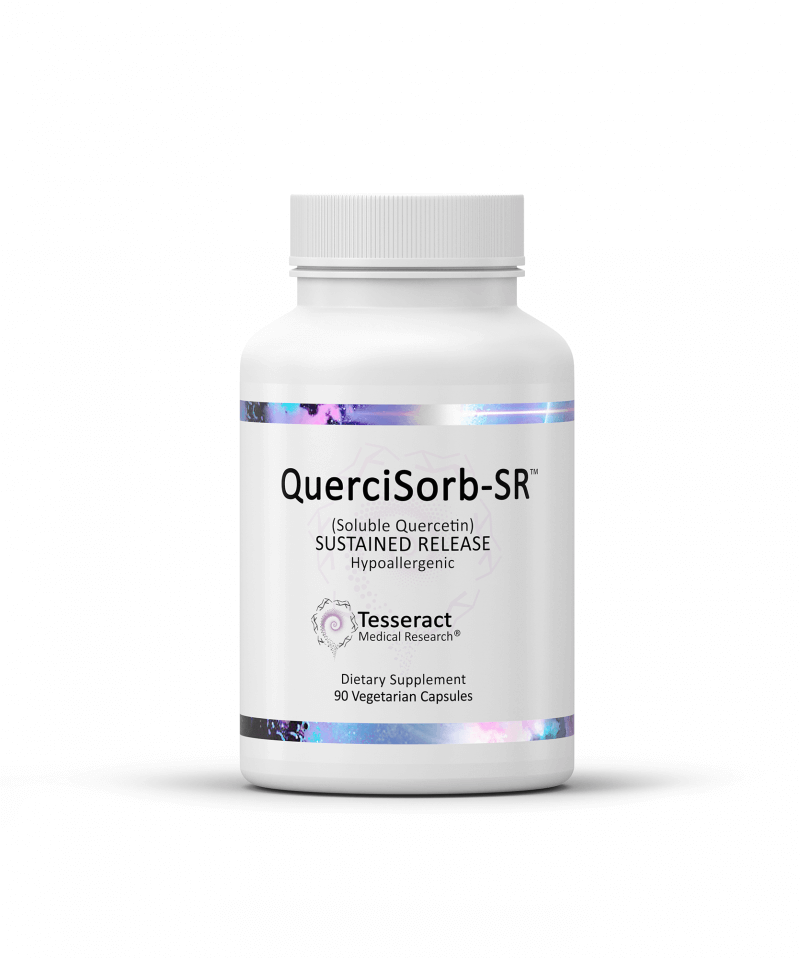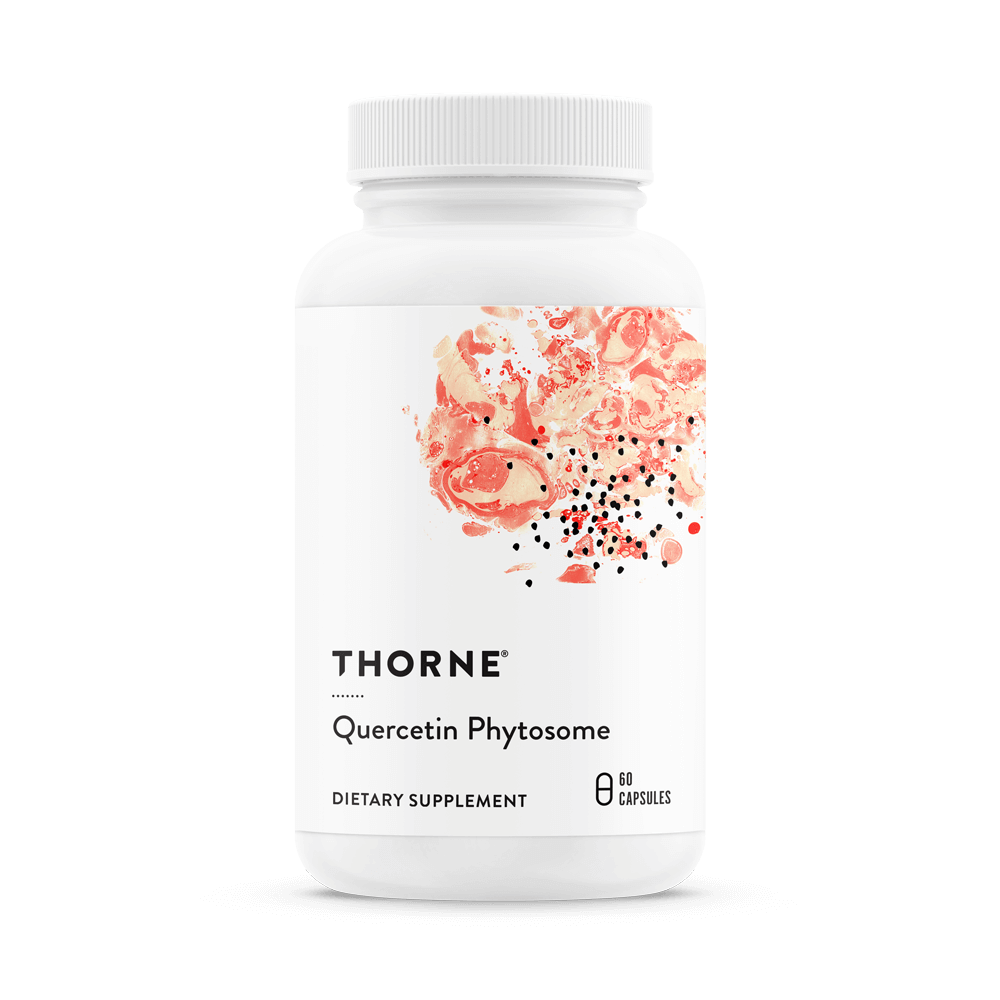Quercetin - benefits & what is the best absorbed form?
What is Quercetin and What Are Its Benefits
Quercetin is a naturally occurring flavonoid found mainly in vegetables, fruits and nuts with the highest concentrations in apples, onions, broccoli, green and black teas. Anyone who has tried quercetin supplements would have noticed its distinct citron-yellow colour.
Quercetin has a wide range of health benefits due to its antioxidant, antitumoral, anti-inflammatory, antimicrobial, antiviral properties, antithrombotic activity & acts as a vasodilator. Quercetin can also help with slowing down the aging process and acts as a senolytic compound.
In more recent studies Quercetin has been shown to have an inhibitory effect on enzymes of SARS-CoV-2 & also the expression of the human ACE2 receptors. Thanks to these latest findings Quercetin now has added anti-COVID-19 activity to it's already extensive list of health benefits.
Quercetin supplements, in their traditional quercetin dihydrate form, inherently have drawbacks . Given quercetins hydrophobic properties it is poorly soluble, low bioavailability and fairly low absorption when taken orally thus limiting it’s therapeutic potential. In response to these issues, Quercetin Phytosome has been developed; utilizing an advanced food-grade delivery system with sunflower phospholipids for greater absorption and effectiveness. I’ll elaborate more on this later in the post.
Quercetin & COVID-19 Research
Taking account of the anti-inflammatory and thrombin-inhibiting characteristics of quercetin, scientists have suggested research be conducted to explore the possibility that Quercetin Phytosome could be used in combination with conventional medical care for COVID-19. (Di Perro et.al., 2021).
Research has identified that quercetin remarkably is able to alter expression of around 30% of the genes in human cells encoding protein targets of SARS-CoV-2 & thus potentially interfere with 85% of SARS-CoV-2 proteins (Glinsky G., 2020).
Di Perro’s research team have conducted two studies in 2021 exploring the potential role of Quercetin in the management of COVID-19. One of the studies was a 2-week, randomized, open-label, and controlled clinical study whereby they enrolled 42 COVID-19 outpatients. Twenty-one were treated with the standard of care (SC), and 21 with Quercetin Phytosome as add-on supplementation to the SC. Their aims were to check virus clearance and symptoms. In conclusion they found
“Quercetin Phytosome statistically shortens the timing of molecular test conversion from positive to negative, reducing at the same time symptoms severity and negative predictors of COVID-19.”
In their other study a prospective, randomized, controlled, and open-label study, a daily dose of 1000 mg of Quercetin Phytosome was investigated for 30 days in 152 COVID-19 outpatients to disclose its adjuvant effect in treating the early symptoms and in preventing the severe outcomes of the disease. In conclusion they found
“Quercetin Phytosome is a safe agent and in combination with standard care, when used in early stage of viral infection, could aid in improving the early symptoms and help in preventing the severity of COVID-19 disease” (Di Perro et.al., 2021).
In a more recent study Rondanelli et.al., (2022) looked at the potential effect of 3 months supplementation with Quercetin Phytosome® (250 mg twice a day) as prevention against symptomatic COVID-19. They had 120 total subjects, 60 in the supplementation group and 60 in the placebo group. Subjects underwent rapid COVID-19 diagnostic tests every 3 weeks. During the study 5 subjects had COVID-19, 1 out of 60 subjects in the quercetin group and 4 out of 60 in the control group. Complete clinical remission was recorded at 7 and 15 days in the quercetin and placebo groups, respectively. They concluded
“Obtained results are encouraging, but further studies are required to add quercetin as regular prophylaxis.”
Shohan et al., (2022) conducted research to see whether adding quercetin alongside antiviral drugs remdesivir and favipiravir was able to prevent the progression of the COVID-19 into the critical phase. They compared those receiving 1000mg of Quercetin daily along side remdesivir and favipiravir versus those receiving only remdesivir and favipiravir. They found:
“According to the results, taking quercetin was significantly associated with partial earlier discharge and reduced serum levels of ALP, q-CRP, and LDH in the intervention group.”
Image credit: Rondanelli et.al., (2022) - Various Mechanisms How Quercetin interferes with Coronavirus
Antioxidant, Antitumoral & Anti-Inflammatory Properties of Quercetin
Quercetin has been shown to stimulate the production and expression of potent antioxidant endogenous enzymes, such as catalase, glutathione peroxidase, and superoxide dismutase. With these powerful antioxidants in play at higher concentrations in your tissue cells, they can protect against oxidative stress while promoting cellular health (Xu D., et.al., 2019).
Quercetins anti-inflammatory properties are owed to its ability to reduce the expression of cyclooxygenase and lipoxygenase enzymes which in turn reduces the production of inflammatory mediators in the bod y (Warren C.A., et.al., 2008).
Reaseach has identified that quercetin has quite a potent effect on promoting apoptosis (programmed cell death) in certain cancer cells as well as reducing the volume of tumors.
Antimicrobial Activity of Quercetin
Quercetin has been shown in numerous studies demonstrating antimicrobial activity against a broad spectrum of bacteria, with it's strongest activity against gram positive bacteria. One research study found quercetin effective at inhibiting the growth of notoriously resistant bacterial organisms such as Staphylococcus aureus, Proteus vulgaris, Shigella flexneri, Escherichia coli, and Pseudomonas aeruginosa (Jaisinghani et al., 2017).
Quercetin has also been investigated for its antimicrobial activity against pathogens implicated in periodontal disease. Interestingly antibacterial activity against Actinobacillus actinomycetemcomitans and Porphyromonas gingivalis was shown with quercetin.
Antiviral Properties of Quercetin
Quercetin has shown antiviral properties by inhibiting the entry of viruses into the host cells, such as in the case against certain influenza strains. Quercetin also stimulates the antiviral signaling of mitochondria, improving the body’s disease-fighting ability. As already discussed quercetin boasts antiviral properties against SARS-CoV-2 .
Other studies have shown identified quercetin to have antiviral effects on the Herpesviridae family in particular has been shown to inhibit replication of Herpes Simplex Virus 1 & 2 as well as human cytomegalovirus.
Studies have shown in mice, when injected with quercetin prior to being exposed to EBOLA virus it was able to prevent infection.
This is certainly not an exhausting review of the research into the broad range of viruses and microbes quercetin has been shown to act upon but hopefully you get the idea in that it has some solid research behind it as a broad acting antimicrobial and antiviral.
Image credit: (Imran et al., 2022). Stages where Quercetin inhibits SARS-CoV-2 replication
Antiaging Properties of Quercetin
Cellular senescence is a state of permanent cell cycle arrest, brought about by multiple stressors such as telomere dysfunction, genotoxic damage or oxidative stress. Aging cells lead to tissue deterioration in old age and the build-up of senescent cells contributes to lipid deposition and fat accumulation in the liver.
Quercetin has been identified as an antiaging compound as it interferes with various components of senescence such as interacting with receptor sites, regulation of certain genes.
The best supplement form of Quercetin to take for optimal absorption
As touched on already, Quercetin has numerous health benefits, but its limited solubility and low oral absorption have held it back from reaching its full potential as a supplement. Significant research efforts have been dedicated to addressing the inherit low absorption issues with traditional quercetin dihydrate forms in order to maximize the potential of this natural compound. With many different quercetin supplements available the average consumer is often left wondering what quercetin is best?
Meet Quercetin Phytosome a new food-grade lecithin-based formulation of quercetin which has recently been developed to provide enhanced solubility of quercetin. This revolutionary formula was found to raise plasma levels of quercetin in human volunteers up to 20 times more than regular doses administered orally! So based off the current available research it’s pretty clear that quercetin phytosome is the far superior form when supplementing orally.
Studies have shown that Quercetin Phytosome has been able to reach very high plasma levels of quercetin, in fact 20 x more than that of standard quercetin supplements (Riva et.al., 2019).
Where to buy Quercetin in Australia
If you are looking for high quality Quercetin supplements we have a range available at our online store including the more bioavailable Thorne Quercetin Phytosome capsules. Another quite unique quercetin supplement is Tesseract QuerciSorb Immuphore SR which combine Zinc, Vitamin D and Vitamin C with Ionophoric Quercetin. Tesseract also do a straight Sustained Release Quercetin - QuerciSorb-SR
I have been prescribing quercetin for a a long time now with my patients for health issues such as allergies, hayfever, eczema & in more recent years as these newer supplements have become available have switched over. I’ve personally been using with myself and family members the Thorne Quercetin Phytosome & Tesseract Quercisorb Immuphore SR throughout the pandemic time and have full trust & confidence in these reputable companies.
** Note this blog post has been edited and updated in January 2023 to include the latest research findings that have since been released since initially writing this article **
References
Cai, X., Fang, Z., Dou, J., Yu, A. and Zhai, G., 2013. Bioavailability of Quercetin: Problems and Promises. Current Medicinal Chemistry, 20(20), pp.2572-2582.
Di Pierro, F., Derosa, G., Maffioli, P., Bertuccioli, A., Togni, S., Riva, A., Allegrini, P., Khan, A., Khan, S., Khan, B., Altaf, N., Zahid, M., Ujjan, I., Nigar, R., Khushk, M., Phulpoto, M., Lail, A., Devrajani, B. and Ahmed, S., 2021. Possible Therapeutic Effects of Adjuvant Quercetin Supplementation Against Early-Stage COVID-19 Infection: A Prospective, Randomized, Controlled, and Open-Label Study. International Journal of General Medicine, Volume 14, pp.2359-2366.
Di Pierro, F., Iqtadar, S., Khan, A., Ullah Mumtaz, S., Masud Chaudhry, M., Bertuccioli, A., Derosa, G., Maffioli, P., Togni, S., Riva, A., Allegrini, P. and Khan, S., 2021. Potential Clinical Benefits of Quercetin in the Early Stage of COVID-19: Results of a Second, Pilot, Randomized, Controlled and Open-Label Clinical Trial. International Journal of General Medicine, Volume 14, pp.2807-2816.
DI PIERRO, F., KHAN, A., BERTUCCIOLI, A., MAFFIOLI, P., DEROSA, G., KHAN, S., KHAN, B., NIGAR, R., UJJAN, I. and DEVRAJANI, B., 2021. Quercetin Phytosome® as a potential candidate for managing COVID-19. Minerva Gastroenterology, 67(2).
Gasmi, A. et al. (2022) “Quercetin in the prevention and treatment of coronavirus infections: A focus on SARS-COV-2,” Pharmaceuticals, 15(9), p. 1049. Available at: https://doi.org/10.3390/ph15091049.
Geoghegan, F., Wong, R.W.K. and Rabie, A.B.M. (2009) “Inhibitory effect of quercetin on periodontal pathogens in vitro,” Phytotherapy Research, 24(6), pp. 817–820. Available at: https://doi.org/10.1002/ptr.3014.
Glinsky, G.V. (2020) “Tripartite combination of candidate pandemic mitigation agents: Vitamin D, quercetin, and estradiol manifest properties of medicinal agents for targeted mitigation of the COVID-19 pandemic defined by genomics-guided tracing of SARS-COV-2 targets in human cells,” Biomedicines, 8(5), p. 129. Available at: https://doi.org/10.3390/biomedicines8050129.
Hashemzaei, M. et al. (2017) “Anticancer and apoptosis-inducing effects of quercetin in vitro and in vivo,” Oncology Reports, 38(2), pp. 819–828. Available at: https://doi.org/10.3892/or.2017.5766.
Imran, M. et al. (2022) “The therapeutic and prophylactic potential of quercetin against COVID-19: An outlook on the clinical studies, inventive compositions, and patent literature,” Antioxidants, 11(5), p. 876. Available at: https://doi.org/10.3390/antiox11050876.
Jaisinghani, R.N. (2017) “Antibacterial properties of quercetin,” Microbiology Research, 8(1). Available at: https://doi.org/10.4081/mr.2017.6877.
Kim, C.H., Kim, J.-E. and Song, Y.-J. (2020) “Antiviral activities of quercetin and isoquercitrin against human herpesviruses,” Molecules, 25(10), p. 2379. Available at: https://doi.org/10.3390/molecules25102379.
Riva, A., Ronchi, M., Petrangolini, G., Bosisio, S. and Allegrini, P., 2018. Improved Oral Absorption of Quercetin from Quercetin Phytosome®, a New Delivery System Based on Food Grade Lecithin. European Journal of Drug Metabolism and Pharmacokinetics, 44(2), pp.169-177.
Rondanelli, M., Perna, S., Gasparri, C., Petrangolini, G., Allegrini, P., Cavioni, A., Faliva, M., Mansueto, F., Patelli, Z., Peroni, G., Tartara, A. and Riva, A., 2022. Promising Effects of 3-Month Period of Quercetin Phytosome® Supplementation in the Prevention of Symptomatic COVID-19 Disease in Healthcare Workers: A Pilot Study. Life, 12(1), p.66.
Shohan, M. et al. (2022) “The therapeutic efficacy of quercetin in combination with antiviral drugs in hospitalized COVID-19 patients: A randomized controlled trial,” European Journal of Pharmacology, 914, p. 174615. Available at: https://doi.org/10.1016/j.ejphar.2021.174615.
Warren, C.A. et al. (2008) “Quercetin may suppress rat aberrant crypt foci formation by suppressing inflammatory mediators that influence proliferation and apoptosis,” The Journal of Nutrition, 139(1), pp. 101–105. Available at: https://doi.org/10.3945/jn.108.096271.
Xu, D. et al. (2019) “Antioxidant activities of quercetin and its complexes for medicinal application,” Molecules, 24(6), p. 1123. Available at: https://doi.org/10.3390/molecules24061123.
None of the products or information presented are intended to diagnose, treat, cure or prevent any disease. The information contained herein is for informational purposes only and does not establish a doctor-patient relationship.








